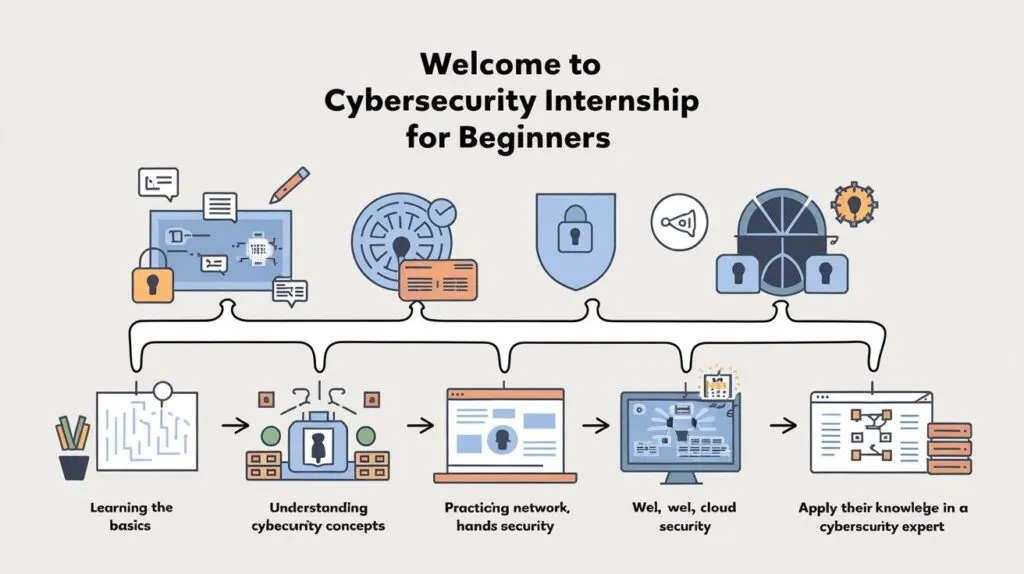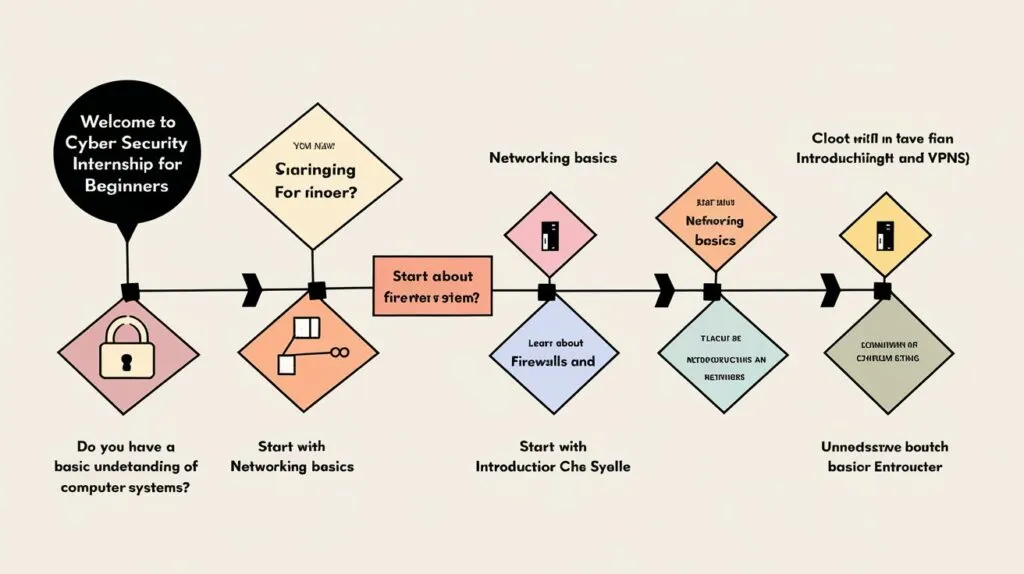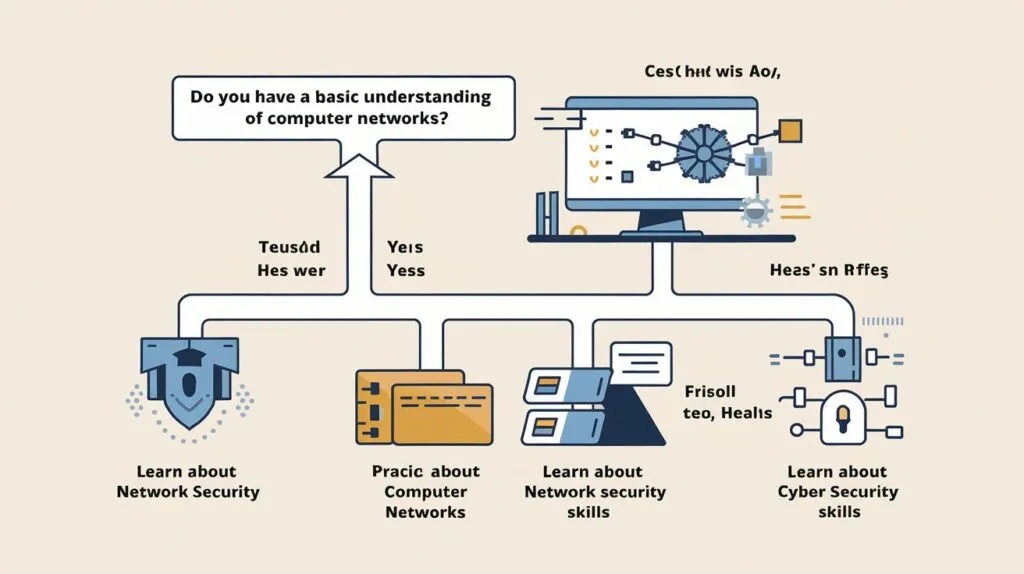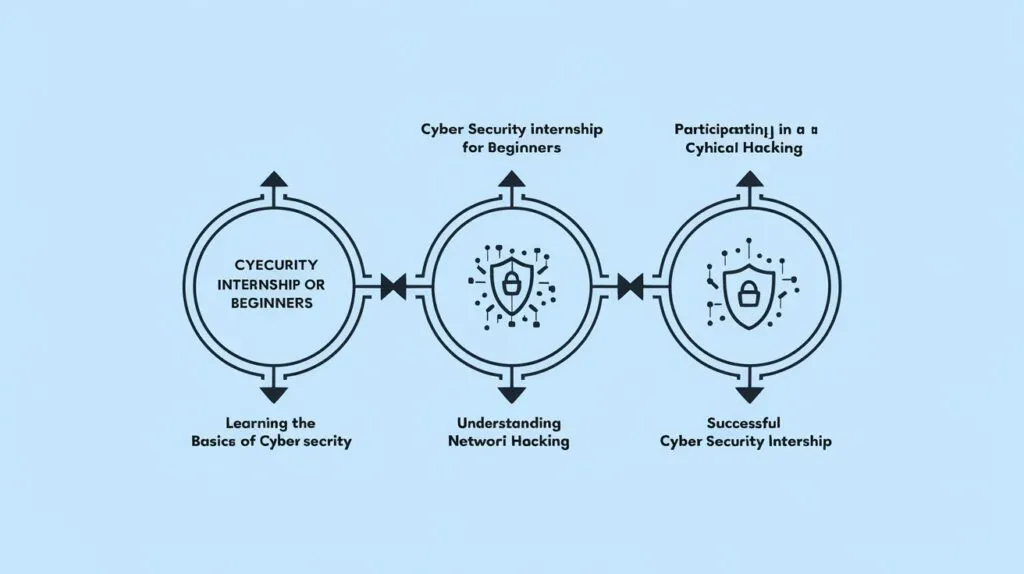What is a cyber security internship for beginners?
That is why it is inspiring and gratifying to enter cybersecurity as a fresh worker or even a student. The demand for cybersecurity professionals is rising along with the digital world. Internships are a great way for those interested in cybersecurity to get real-world experience, learn important skills, and see the many career paths available.
This guide will help you understand the world of cybersecurity internships. You’ll learn about the basic skills needed for entry-level jobs and the different career paths out there. We aim to give you the knowledge and tools to thrive in your cybersecurity career. click here
Key Takeaways
- Explore the key skills and qualifications needed for entry-level cybersecurity roles.
- Understand the common career paths in the cybersecurity industry.
- Learn about the essential technical skills and certifications to pursue for internship success.
- Learn where to look for the top internships in cybersecurity.
- Develop a strong application portfolio and networking strategies.
- Prepare for the challenges and expectations of a cybersecurity internship.
- Maximize your internship experience to jumpstart your cybersecurity career.

- Understanding the Fundamentals of Cybersecurity Careers :The field of cybersecurity is booming, with lots of entry-level jobs. To succeed, you need a blend of cybersecurity skills. These include technical skills and problem-solving abilities, crucial for a rewarding career in entry-level cybersecurity jobs.
- Key Skills Required for Entry-Level Positions:Cybersecurity jobs seek individuals with knowledge in network security, data encryption, and vulnerability detection. They also value soft skills like critical thinking, effective communication, and teamwork. Cybersecurity certifications are known to help one advance in his or her chosen profession.
- Common Career Paths in Cybersecurity
- Cybersecurity Analyst
- Penetration Tester
- Security Administrator
- Incident Response Specialist
- Security Consultant
- Industry Certifications Worth Pursuing
- For beginners, key cybersecurity certifications include:
- 1. CompTIA Security+
- 2. Certified Ethical Hacker (CEH)
- 3. Certified Information Systems Security Professional (CISSP)
- Such certifications are proof of your sanity in matters cybersecurity and Fleetwood.
- “Following this understanding, cybersecurity is not just a technical issue but a business issue for organizations of all types and scales”.
- “In reality, cybersecurity is more than an IT problem. it is a “executive problem” for organizations of any type and of any size.”
- Preparing for Your Cyber Security Internship
- An exciting first step toward a rewarding career is beginning an internship in cybersecurity. To maximize your internship experience, thorough preparation is essential. Let’s explore the key steps to prepare for your cybersecurity internship.

- Educational Requirements and Recommended Courses:Most cybersecurity internships require a solid background in computer science or information technology. To increase your chances, consider obtaining certifications or taking online courses. Focus on areas such as:
- Network security
- Cybersecurity fundamentals
- Ethical hacking and penetration testing
- Cryptography and data protection
These courses will help you develop the skills and knowledge needed for your internship.
Hands-on Experience and Self-Study
The employers seek interns who have practical experience in the area of cybersecurity. Thus, it is possible to demonstrate one’s abilities working on personal works or meeting the challenges of cybersecurity competitions. This will enhance your proficiency in your field and proves your passion towards your respective professions.
Other prescribes are to stay updated on the current happenings in cybersecurity. Open industry publications, attend Webinars, get associated with cybersecurity group. This will assist you to be unique in your internship placing you in a unique position to ace your internship.
| Recommended Courses | Hands-on Experience |
| Network Security Ethical Hacking Cryptography Cybersecurity Fundamentals | Personal Projects Cybersecurity Competitions Open-source Security Tools |
You will be prepared to get the most out of your internship if you follow these guidelines. You’ll have a good chance of succeeding as a cybersecurity specialist.

Essential Technical Skills for Internship Success
Starting a cybersecurity internship needs a strong base in technical skills. To do well, you must know key programming languages, network security basics, and important security tools.
Programming Languages to Master
Understanding Python and C++ is essential for interns in cybersecurity.. These languages help you automate tasks, write security scripts, and check network traffic. Learning these languages well will help you stand out in your internship.
Network Security Basics
It’s important to understand network security basics for any internship. Learn about TCP/IP protocols, firewalls, intrusion detection, and vulnerability checks. Knowing these will help you spot and fix security problems.
Security Tools and Software
Cybersecurity pros use special tools and software. Learning to use Wireshark for network checks, Nmap for scans, and Metasploit for tests is helpful. These skills will help you tackle cybersecurity issues.
| Cybersecurity Programming Languages | Network Security Fundamentals | Security Tools and Software |
| Python, C++ | TCP/IP protocols, firewall configurations, intrusion detection systems | Wireshark, Nmap, Metasploit |
There are several technical basics for a cybersecurity intern that can prepare one for a career in this competitive but exciting and growing industry.
Where to Find Cyber Security Internship Opportunities
A rewarding career in information security might be attained by locating a cybersecurity internship. There are many places to look for the right internship. Job boards, company websites, and networking events are all good places to start.
Start by checking out cybersecurity internship listings on job platforms. These sites have a wide range of internships, from top tech companies to government cybersecurity agencies. Best match for your skills and interests.
Don’t forget to check company websites for cybersecurity internship openings. The career sections of tech companies and cybersecurity organizations often list internships. Some even have special programs for interns, offering valuable experience.
Networking events and career fairs are also great for finding internships. Going to industry conferences, meetups, or university career events can help you meet people from tech companies and government cybersecurity agencies. You might find internship opportunities that aren’t listed online.
| Source | Advantages | Challenges |
| Job Boards | Vast selection of internship listings Ability to filter by location, industry, and job type | Highly competitive application process Requires thorough research to identify relevant openings |
| Company Websites | Direct access to employer-specific internship programs Opportunity to learn about company culture and values | Limited to openings at individual organizations May require more proactive outreach and networking |
| Networking Events | Chance to make personal connections with industry professionals Potential to uncover unadvertised internship opportunities | Requires significant time and effort to attend events Networking skills are essential for success |
This will help you start your career in cybersecurity.

Building a Strong Application Portfolio
As you prepare for your cybersecurity internship, it’s key to have a strong application portfolio. This guide will help you make a great resume, work on personal projects, and build an online presence. This will show off your skills and help you stand out in the job market.
Creating an Impressive Resume
Your cybersecurity resume is the first thing employers see. So, make sure it’s well-made. List your technical skills, relevant classes, and personal projects. Use simple language and show your achievements with numbers.
Developing Personal Projects
Employers in cybersecurity love to see hands-on experience. Start side projects that show your technical and problem-solving abilities. You could build a home network, create a security-focused app, or join online challenges.
Online Presence and Professional Networking
Today, a LinkedIn for cybersecurity profile is an important thing. To make your resume different, try to focus on your talents and accomplishments and perhaps your references. Third, participate in online forums, attend webinars, and engage with professionals. This will make you build the network and ensure that you are updated with the new trends or jobs.
So the more solid your application portfolio is, the better your odds will be of landing a cybersecurity internship. This is a huge first step towards the achievement of a fulfilling and rewarding career in this revolutionary area.
The best thing one can do is stop

What to Expect During Your Internship
Starting your cybersecurity internship experience means diving into a world of learning and growth. You’ll tackle a variety of tasks that will boost your skills and knowledge. This journey is important and essential for successful career in the sphere of cybersecurity.
Getting guidance from experienced cybersecurity pros is a big plus. They’ll help you through real-world projects. You’ll get feedback and insights that are crucial for understanding the field.
- Participate in security assessments and audits to gain firsthand experience in identifying and mitigating vulnerabilities.
- Assist in the implementation and configuration of security tools and technologies, such as firewalls, intrusion detection systems, and encryption protocols.
- Collaborate with cross-functional teams to develop and test incident response plans, ensuring your organization is prepared to handle cyber threats effectively.
- Engage in research and analysis to stay informed about emerging cybersecurity trends, best practices, and industry regulations.
Your cybersecurity internship experience is a chance to apply your skills, learn more, and make professional connections. Be open to challenges, look for ways to learn, and use your mentors’ advice. This experience is truly valuable.
In reality, the value of a cybersecurity internship employer is wrapped in the fact that internship participants are taken under the wing of experienced professionals. They will help you develop insights into the industry along with arming you with tools that will enable one to work within this unsteady environment.
Common Challenges in Cybersecurity Internships
Starting a cybersecurity internship is exciting and full of learning opportunities. But, it also has its challenges . You may find it difficult to manage projects, fit in with the company culture, and possess technical skills.
Technical Learning Curves
Cybersecurity changes fast, with new tech and methods popping up all the time. The complex details of everything could overcome you.. But, by being open to learning, you can master these challenges and grow as a cybersecurity pro.
Workplace Integration
Going from school to work can be tough. You’ll need to get used to team dynamics, office politics, and talking to colleagues. Being proactive in building relationships and seeking guidance can help you fit in.
Project Management Skills
It is clear that cybersecurity internships imply the participation in large-scale projects. Some of the things you will need are: Aim and objectives, team, and time. It’s important that you acquire these skills for your career path in cybersecurity to be successful.
Through them, interns help themselves face and solve some of the normal problems that usual figure out in the course of field work. They will learn a lot and formally open the right path in a new profession as a cybersecurity specialist.

How to maximize your internship experience
Just begun the cybersecurity internship? Be proactive. Ask your colleagues more about the field of interest as they may have massive knowledge regarding the same. Get directions, accept criticisms and continue to acquire knowledge. This will show you’re a serious person who is interested in his or her career progression.
This is not a technology thing Only; talk to professionals, attend conferences, and learn as many cyber jobs as you can. These steps will make your scope broader and will assist you to determine what you actually seeking for a career.
As I have said, a great internship is way beyond the responsibility of carrying out tasks assigned to you. It’s about getting yourself immersed in the cybersecurity space, establishing connections and positioning yourself for success in the future. Be ready for responsibilities, maintain interest, and transformation this internship into the opportunity in the sphere of cybersecurity.

FAQ
What key skills are required for entry-level cybersecurity positions?
For entry-level cybersecurity roles, you need to know programming languages like Python and C++. You should also understand network security basics. Familiarity with tools like Wireshark, Nmap, and Metasploit is important too.
What are some common career paths in the cybersecurity field?
In cybersecurity, you can become a security analyst, penetration tester, or administrator. You might also work as an incident response specialist or consultant. The field offers many specializations and growth opportunities.
What industry certifications are worth pursuing for aspiring cybersecurity professionals?
For entry-level roles, consider getting CompTIA Security+, Certified Ethical Hacker (CEH), or Certified Information Systems Security Professional (CISSP). Your proficiency and commitment to cybersecurity are demonstrated by these credentials.

How can I prepare for a cybersecurity internship?
To get ready for a cybersecurity internship, focus on your education and hands-on experience. Take online courses, join hackathons, and build a portfolio of your work.
What programming languages should I master for a cybersecurity internship?
Knowing Python and C++ is crucial for a cybersecurity internship. These languages are used for scripting, automated testing, and vulnerability analysis.
Where can I find cybersecurity internship opportunities?
Look for cybersecurity internships on job boards, company websites, and at career fairs. Networking events can also lead to opportunities. Research and connect with potential employers to find the right fit for you.
How can I build a strong application portfolio for a cybersecurity internship?
Create a standout resume that showcases your technical skills and projects. Include any relevant certifications or coursework. Also, have a professional online presence, like a LinkedIn profile, and share your personal projects or contributions to the cybersecurity community.
What can I expect during a cybersecurity internship?
Internships involve tasks like vulnerability assessments, network monitoring, and incident response. You’ll also work on security policy development. Mentorship from experienced professionals is key, helping you grow your skills and gain insights.
What are some common challenges faced by cybersecurity interns?
Interns often face steep learning curves, adapting to work culture, and managing projects. Good time management, communication, and a willingness to learn can help you overcome these challenges and make the most of your internship.


